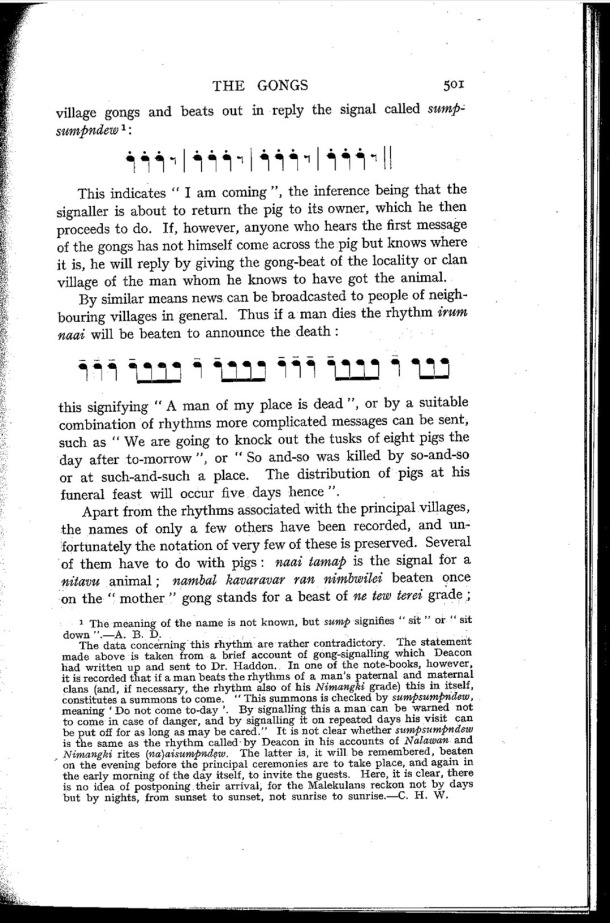|
|  [Note: this transcription was produced by an automatic OCR ENGINE]
,5.
.,.
E.
'3s‘r~2ra:rs=:'1*
THE GONGS 501
village gongs and beats out in reply the signal called sump-'
sumjmdew 1 :
11ï¬Å‘|171“lï¬Å11"|111‘H
This indicates " I am coming ", the inference being that the
signaller is about to return the pig to its owner, which he then
proceeds to do. If, however, anyone who hears the ï¬Årst message
of the gongs has not himself come across the pig but knows where
it is, he will reply by giving the gong-beat of the locality or clan
village of the man whom he knows to have got the animal.
By similar means news can be broadcasted to people of neigh-
bouring villages in general. Thus if a man dies the rhythm imm
naai will be beaten to announce the death :
lllljjnllllllllllljjlllj
this signifying " A man of my place is dead ", or by a suitable
combination of rhythms more complicated messages can he sent,
such as “ We are going to knock out the tusks of eight pigs the
day after to-morrow or " So and-so was killed by so-and-so
or at such-and-such a place. The distribution of pigs at his
funeral feast will occur ï¬Åve days hence ". V
Apart from the rhythms associated with the principal villages,
the names of only a few others have been recorded, and un~
fortunately the notation of very few of these is preserved. Several
of them have to do with pigs: mzai iamap is the signal for a
nitavu animal ; nambal kavaravar um nimb1m'lei beaten once
on the “ mother " gong stands for a beast of ne tew tevei grade ;
1 The meaning oi the name is not known, but sump signiï¬Åes “ sit â€ù or “sit
down ".—A. B. D.
The data concerning this rhythm are rather contradictory. The statement
made above is taken from a brief account of gongsipalling which Deacon
had written up and sent to Dr. Haddon. In one of the notebooks, however,
it is recorded that if a man beats the rhythms of a man's paternal and maternal
clans (and, ii necessary, the rhythm 3150 of his Nimanglzi grade) this in itself,
constitutes a summons to come. " This summons is checked by sumpsumpndsw,
meaning ‘ Dn not come to-day ‘. By signalling this a man can be warned not
to come in case of danger, and by signalling it on repeated days his visit Can
be put oif ior as long as may be cared." It is not clear whether s1.m¢:um[>ndsw
is the same as the rhythm calledby Deacon in his accounts of Nulawan and
Nimnngki rites (nn)aisum4>ndaw, The latter is, it will be remembered, beaten
on the evening before the principal ceremonies are to take place, and again in
the early morning of the day itself, to invite the guests. Here, it is clear, there
is no idea oi postponing their arrival, Ior the Malekulans reckon not by days
but by nights, from sunset to sunset, not sunrise to sunrise.—C. H. W.
|